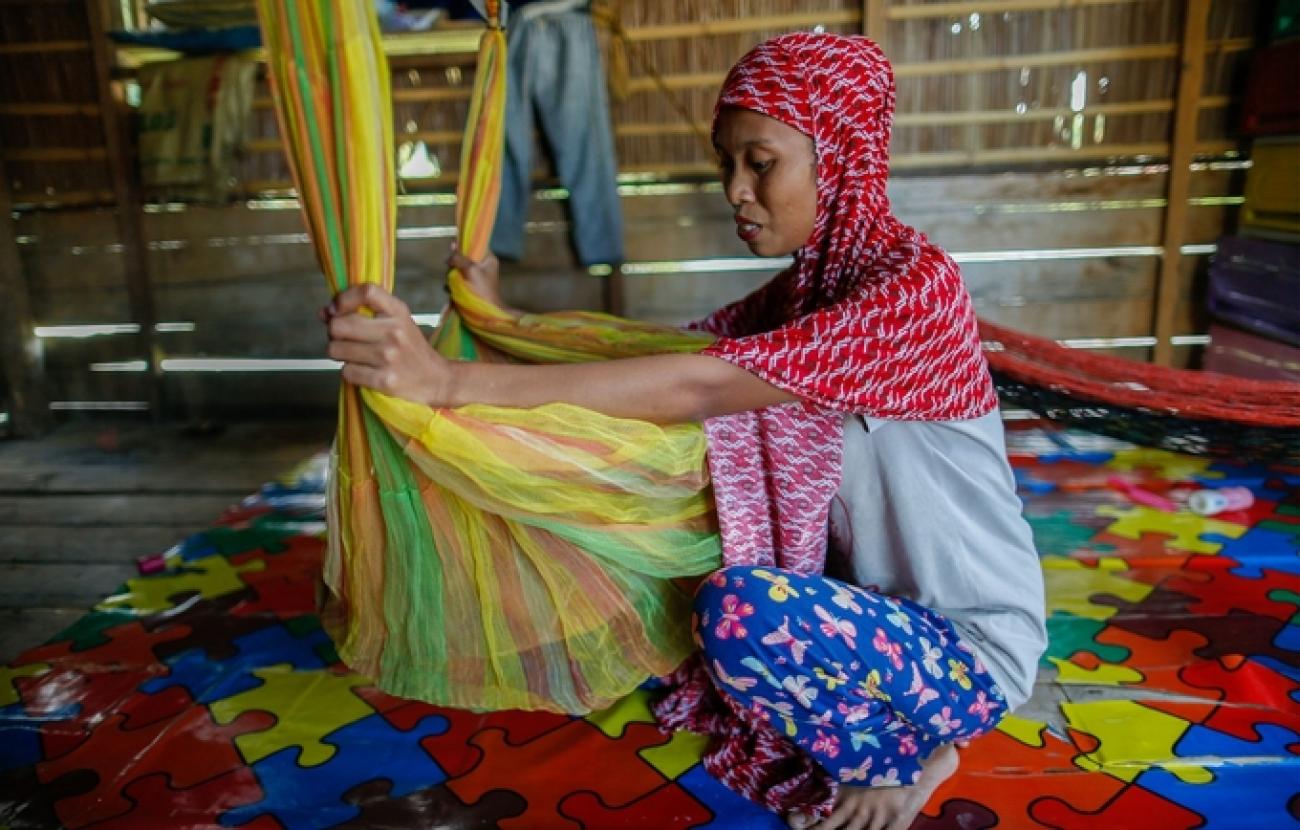A Filipino mother from conflict-ridden Maguindanao determined to save other women from violence

Jehan, 25 and mother of two children, wants to save other women in the same way she found refuge in UNFPA's "Women Friendly Space"
Bullet-riddled houses. Mosques damaged by exploding artillery shells. The old provincial capital city, home to some 30,000 people, cannot still erase the scars and remnants of major armed conflicts that continued for 40 years up to the creation of the Bangsamoro Autonomous Region in Muslim Mindanao (BARMM) in early 2019 following the peace agreement signed between the national government and the Moro Islamic Liberation Front (MILF). From the roads going to her home in the marshland of this southern Philippine town, Jehan Galib can still hear the buzz of helicopter gunships.
“I can’t even remember how many times I had to be evacuated”
Armed conflicts and violence are a mainstay in the lives of Filipino Muslim residents of Maguindanao. More than 120,000 people have been killed, with millions more displaced. “I can’t even count how many times I and my family have had to be evacuated since I was a child,” Jehan, now 25 and a mother of two children, recalls. It almost became a routine for her to flee with her family to a displacement center in Barangay Tina, a far-flung community near the sprawling Liguasan Marsh that covers an area of 2,200 km2 in the Mindanao River basin in the Bangsamoro heartland.
Inside her house built with scruffy lumber close to the marsh, Jehan was trying to calm down her crying 9-month-old youngest daughter, Jayhana. “It’s hard because most of the time, we had to leave the house while the fighting was still going on and mortars were dropping near us," said Jehan. The family's house stands across a mosque where the community, mostly farmers including her husband, prays every Friday. "We always carried clothes, ready to escape. When we returned to our house, we found most of our belongings gone and our house destroyed,” she added.
Finding her place in UNFPA’s Women-Friendly Space
This unstable mode of life marred by constant displacement and destroyed livelihoods, did not allow Jehan to finish college. Cherishing the peace agreement and the creation of BARMM as offering more stability in her life, she also wanted to resume her learning. That is how Jehan subscribed herself to attend the awareness-raising sessions that the United Nations Population Fund (UNFPA) initiated in the province, focusing on women’s rights, gender-based violence, and protection from sexual exploitation and abuses.
This training campaign is a part of UNFPA’s “Women-Friendly Space” (WFS) initiative, which in Maguindanao has been implemented by UNFPA’s NGO implementing partner, the United Youth of the Philippines - Women Incorporated (UNYPHIL). UNFPA together with UNYPHIL has established and run three WFSs in Datu Saudi Ampatuan, Mamasapano, and Shariff Aguak, since November 2019. These areas have the highest numbers of internally displaced persons (IDPs) who have experienced multiple displacements for more than 10 years. The establishment of these three WFSs was supported by the UNFPA Humanitarian Action Thematic Fund (HTF) managed at its headquarters.
UNFPA’s Women Friendly Spaces provide ‘safe space’ for women and girls - including the survivors of GBV and those who face risks of violence - where they can gain knowledge and also access a myriad of services. The WFS clients can seek psycho-social counselling service, with confidentiality ensured. They can also attend various information sessions regarding human rights and women’s health, as well as life-skills training, linked with livelihood programmes. WFS also provides GBV survivors with referral to necessary clinical, police and legal services.
The day-to-day operations of the three WFSs that UNFPA established in Maguindanao with UNYPHIL are now managed by some 60 women survivors from the armed conflicts, who went through the information sessions at WFS and were trained as facilitators, including Jehan. The UNFPA project provides them with cash assistance as stipend to run the WFSs.
Her resolution to finish college, once given up amid conflict
Before attending the info sessions at UNFPA Women Friendly Space and becoming a WFS facilitator herself, Jehan admits that “I myself knew only little about women's rights, as there were very few opportunities to study and learn while fleeing from conflicts and attending to the needs of my children while my husband was away for work.”
The encounter with the Women Friendly Space facilitators and the staff behind these awareness-raising activities opened her eyes, and their dedication to advancing women’s empowerment and gender equality from the grass-root level inspired her, Jehan adds. “They have invested so much of their time to reach people in high-risk areas, to educate and empower those who otherwise would have been left behind. Now, not only I know where to report a case of gender-based violence, but also I know how to teach my fellow women about their rights and motivate them to report if they fall victim to any violence.”
The involvement with WFS gave Jehan confidence and encouragement to continue her degree in education. “Before working at WFS, I did not know that I am capable of doing more than house work. Now I realize it is my right to finish my education and have my own work not just to help provide for my own family, but also protect other women and girls who are suffering from abuse.”
“And my hope is,” Jehan adds, “Someday, my daughters will finish their college education and have a good job when they grow up so they can be independent and stand on their own even if I am gone. They should realize that they can achieve so much. They should no longer have to experience the kind of life that my generation had. I have learned all these at Women Friendly Space.”


